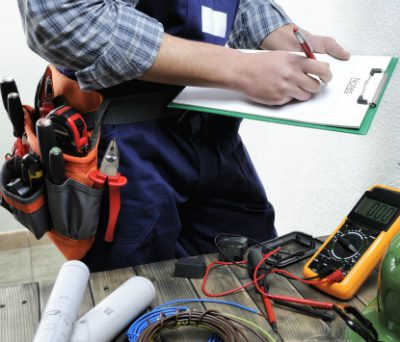If you haven’t done so already, now is the time for every custom integration companies to seriously consider getting an electrical license.
The smart home market is changing so rapidly that having a line-voltage license will not only offer you a certain level of insulation from outside market influences, but also open up an even broader market potential for your company.
According to CE Pro’s latest readership data, 31 percent of custom electronics integration companies already have high-voltage electrical licenses. Hooray! For years, having that ability to do line voltage work without juggling your schedule around another trade has offered quite a bit of flexibility.
Indeed, when the flat panel trend first started, having an electrical license was a real advantage. Since most older homes were never meant to have an electrical outlet high up on the wall, low-top-the-ground plugs needed to be relocated to be directly behind the TV.
Dealers with line voltage licensing didn’t need to wait around for an electrician to make that relatively simple change.
But today, the market opportunities for integrators with electrical licenses goes way beyond simple flat panel TV mounting. Let’s look at a few of them:
Smart Light Switches
Companies like Lutron, Leviton, Noon Home and Brilliant have brought the brains of the smart home into what used to be a simple light switch.
Today, the smart light switch controls not just multiple lighting scenes, but is an intercom, alarm interface, and smart lock controller. The smart light switch provides weather alerts and can adjust the thermostat… all using voice control is some cases.
But… you need to have an electrical license to install these smart switches. Why would you want to be shut out of that potential market?
Lighting Fixtures
We all know that the biggest sea change taking place in the lighting market is low-voltage LED fixtures. This is a category where integrators are encroaching on the tried-and-true electricians’ realm by being able to install cost-efficient, beautiful, IP-controllable low-voltage LED light fixtures without the need for an electrical license.
Led by buying groups like HTSA, Azione, and ProSource, custom integrators are getting a crash course on lighting design that will enable them to break forcefully into this market.
But why stop with just the low-voltage fixtures? Integrators with an electrical license will be able to ply their skills across all forms of lighting, including line voltage fixtures.
PoE Wiring
Do you think the electricians are going to idly sit by tapping their fingers while low-voltage integrators take a chunk of their market (and their revenues, along with thehigh profit margin built in to the fixture business)? No way.
Already in states like New Jersey electricians are lobbying for legislation that will forbid anyone but an electrician from running Category X cable in a home because it has the potential of carrying PoE signals to various devices in the home. If you have an electrical license, you can’t be shut out if these lobbying efforts succeed.
Energy Storage
Companies like RoseWater Energy Group and Sonnen are banking on energy automation as one of the next great waves for this industry. And why not? There is no trade positioned better than the custom installation community to manage energy loads in a smart home environment.
Dealers can intelligently program systems to lighten electrical load usage during peak usage hours, and conversely set up various appliances and other systems to run during off-peak times, when utilities’ time-of-day rates are lower.
Read Next: Why You Might Thank Metallica for Your Next Trained Technician
Moreover, the emphasis from utilities for more clean energy generation from solar, wind and geothermal is going to create the potential for partnerships between integrators and local utilities, not to mention green community developers.
Intelligent Electrical Breakers
Hand in hand with energy storage is smart electrical breakers. Companies like Savant with its Racepoint Energy smart breakers will allow integrators to design smart homes that can open and close individual electrical loads remotely or intelligently by referencing the utilities rates and draw on the power grid.
When electric vehicles start becoming more commonplace from manufacturers like Volkswagen and others, the need for intelligent electrical load energy management will be in high demand.
I know many integrators have strong partnerships with their local electrician. That is a start. Also, in many states getting an electrical license is an arduous process, requiring years of apprenticeship and journeyman training. But in most states you can hire a licensed electrician as a member of your team and utilize his or her license for your company.
Those are just some of the reasons I believe the time is now to get an electrical license for your company. Am I right or wrong?







